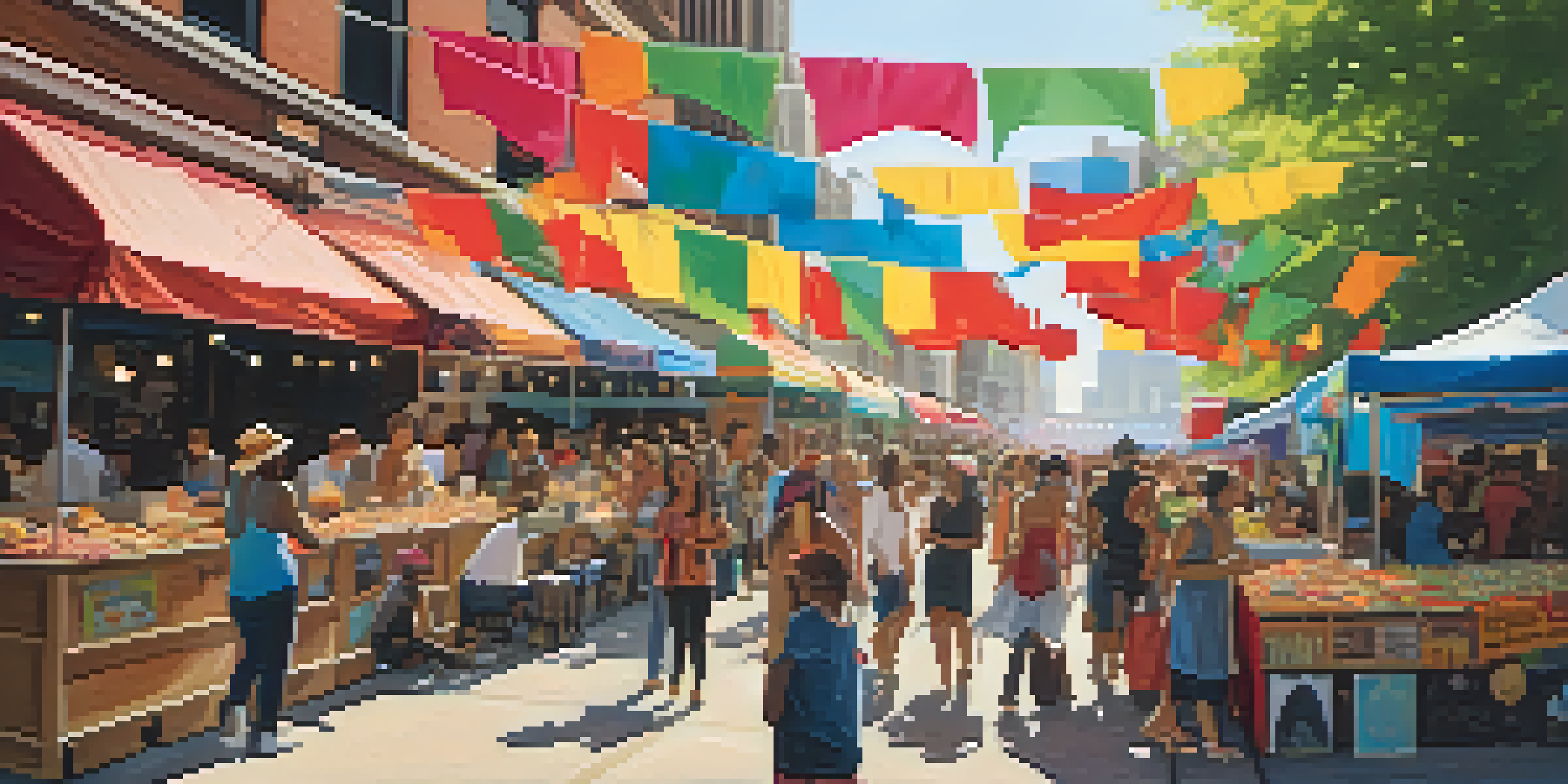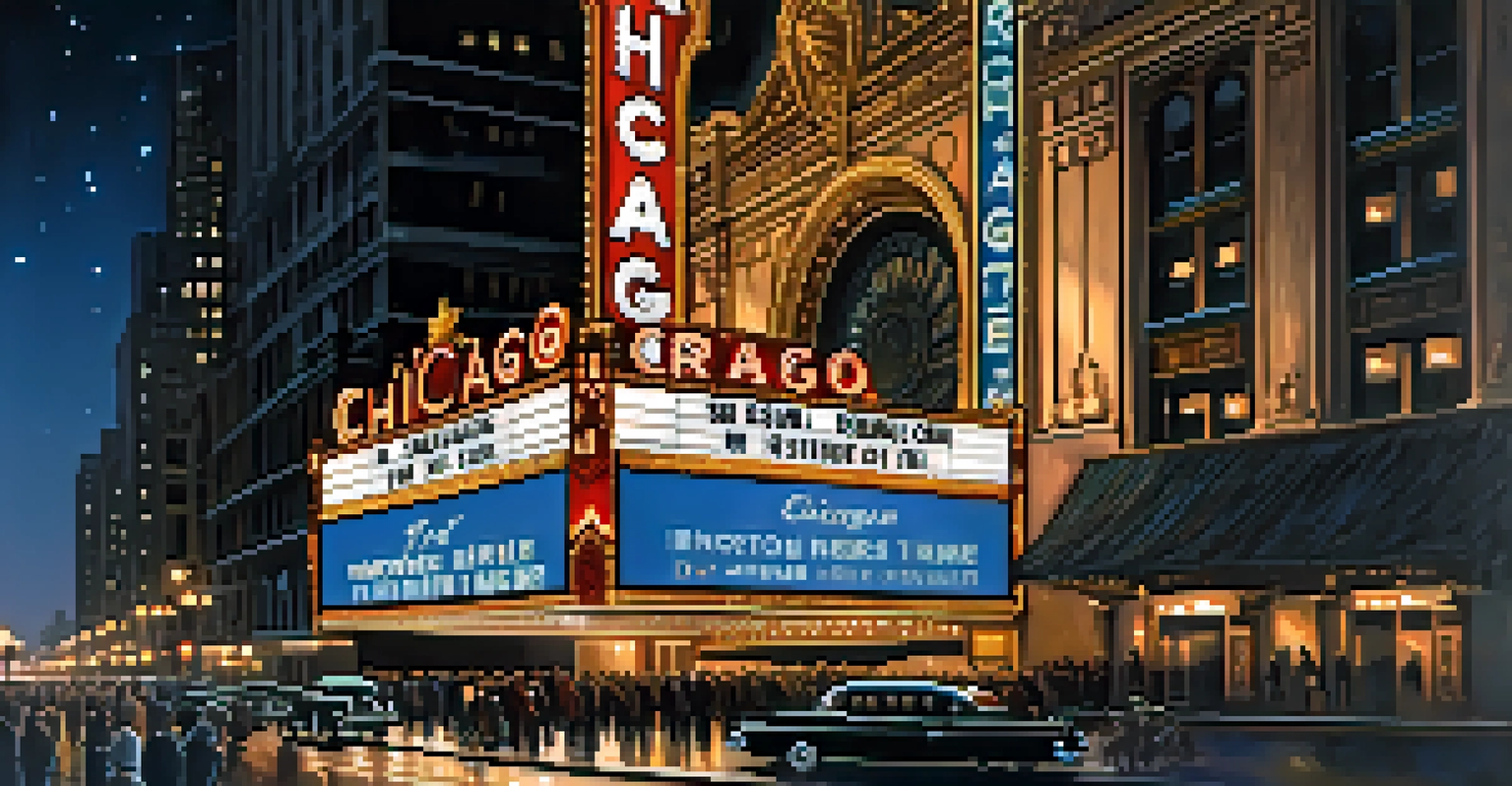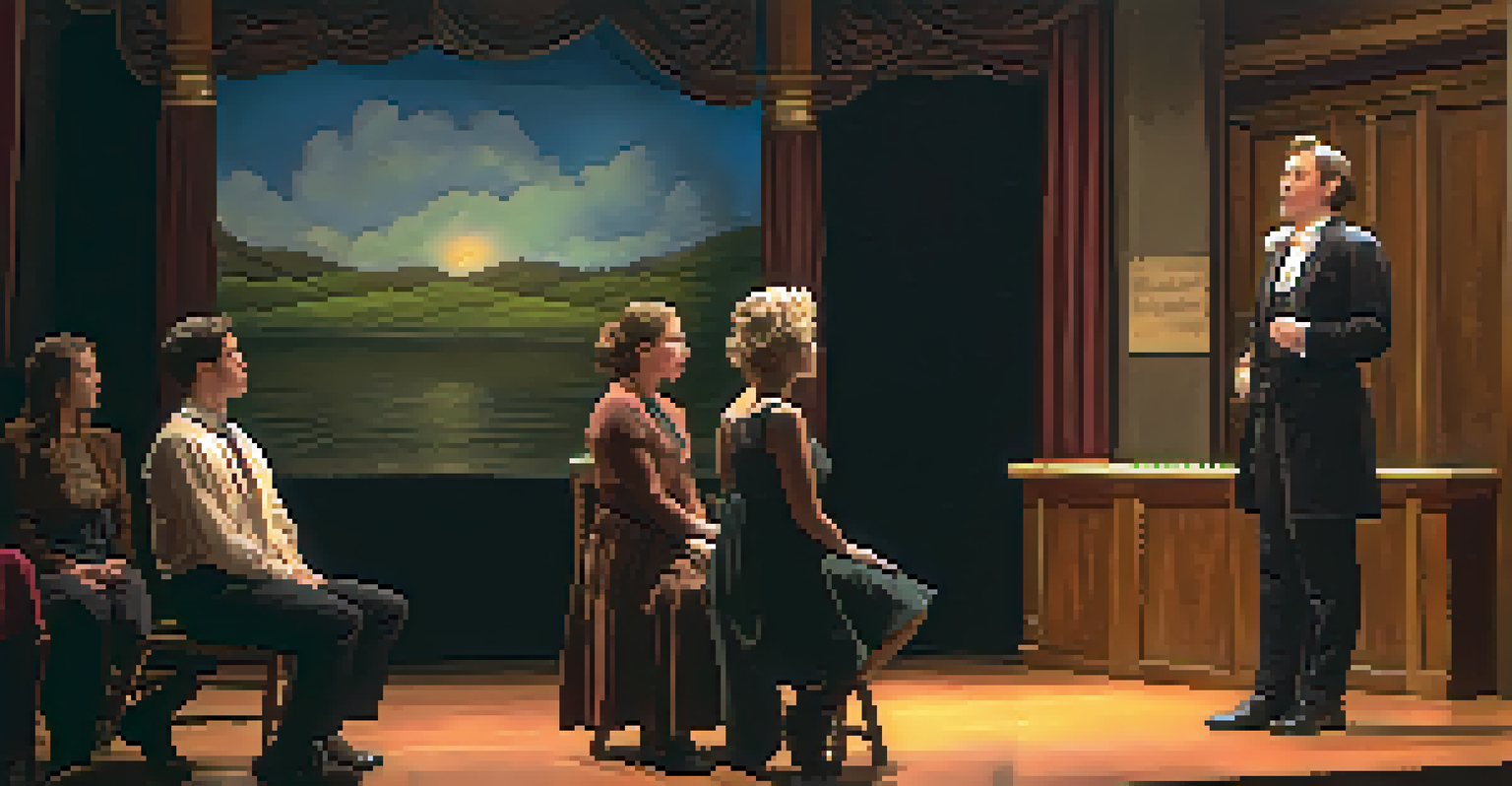Chicago's Performing Arts: A Hub of Theatre and Music

The Rich History of Chicago's Performing Arts
Chicago's performing arts scene is deeply rooted in its history, dating back to the late 19th century. The city has long been a melting pot of cultures, which has greatly influenced its artistic expressions. From the early days of vaudeville to the rise of jazz and blues, Chicago has nurtured a diverse array of performance styles.
Art is the most beautiful of all lies.
As the city evolved, so did its artistic landscape, with iconic venues like the Chicago Theatre and the Goodman Theatre emerging as cultural landmarks. These establishments not only provide a platform for established artists but also support emerging talent, ensuring the arts remain vibrant and accessible. This rich history has laid the foundation for a thriving performing arts community that continues to grow.
Today, Chicago is recognized as one of the premier cities for theatre and music in the United States. Its legacy of innovation and creativity continues to inspire new generations of performers and audiences alike, making the city a true hub of artistic expression.
Theatre: A Diverse Array of Productions
Theatre in Chicago is incredibly diverse, offering everything from classic plays to avant-garde performances. With over 200 professional theatre companies, there's something for everyone, whether it's a heartwarming drama, a laugh-out-loud comedy, or a thought-provoking piece. This variety allows audiences to experience a wide range of emotions and stories.

One of the standout features of Chicago's theatre scene is its commitment to original works. Many local playwrights showcase their talents in smaller venues, fostering a culture of innovation and creativity. This emphasis on new narratives not only enriches the theatrical landscape but also reflects the city's dynamic spirit.
Chicago's Rich Artistic Heritage
The city's performing arts scene has evolved from vaudeville to jazz, establishing Chicago as a cultural hub.
Moreover, Chicago is home to renowned theatre festivals, such as the Chicago Theatre Week and the Chicago Fringe Festival. These events celebrate both established and up-and-coming talent, bringing together artists and audiences in a vibrant showcase of creativity that highlights the city’s thriving theatrical community.
Music: A Melodic Tapestry of Genres
Chicago's music scene is as eclectic as it gets, boasting a rich tapestry of genres from jazz and blues to rock and hip-hop. The city has a storied musical heritage, being the birthplace of the Chicago blues and a major hub for jazz musicians. Legendary artists like Muddy Waters and Louis Armstrong have graced its stages, leaving an indelible mark on the world of music.
The stage is not a place for the timid.
Today, you can find live music in every corner of the city, from intimate cafés to grand concert halls. Venues like the House of Blues and Lincoln Hall regularly feature both local and national acts, ensuring that the spirit of live performance is alive and well. This constant flow of music creates an electric atmosphere that draws both residents and tourists alike.
Additionally, Chicago hosts numerous music festivals throughout the year, such as Lollapalooza and the Chicago Blues Festival. These events not only celebrate the city's diverse musical heritage but also attract top talent from around the globe, further solidifying Chicago's reputation as a vibrant music capital.
Iconic Venues: Where Art Comes Alive
Chicago is home to numerous iconic venues that serve as the backbone of its performing arts scene. The Chicago Theatre, with its stunning marquee and rich history, is a must-visit for anyone looking to experience the city's cultural offerings. It hosts a variety of events, from Broadway shows to concerts, ensuring a little something for everyone.
Another landmark venue is the Lyric Opera of Chicago, known for its grand productions and world-class talent. Its commitment to artistic excellence and innovation keeps audiences coming back for more, as they experience the magic of opera in an extraordinary setting. These venues not only showcase performances but also create memorable experiences.
Diverse Theatre and Music Scene
With over 200 professional theatre companies and a vibrant music landscape, Chicago offers a wide variety of performances for all tastes.
Smaller, more intimate spaces like the Steppenwolf Theatre and the Old Town School of Folk Music provide opportunities for emerging artists to shine. These venues contribute to the rich tapestry of Chicago's performing arts, allowing for a more personal connection between performers and audiences, which is often missing in larger establishments.
Cultural Festivals: Celebrating the Arts
Cultural festivals in Chicago play a significant role in promoting the performing arts and bringing communities together. Events like the Chicago Cultural Mile and the Chicago International Film Festival showcase the city's rich artistic diversity and provide platforms for both local and international talent. These festivals create a vibrant atmosphere where art lovers can immerse themselves in a variety of performances.
During these celebrations, attendees can enjoy everything from theatrical performances and live music to art installations and workshops. This variety not only entertains but also educates, fostering a deeper appreciation for the arts. Festivals like these are a testament to the city's commitment to cultural expression and community engagement.
Moreover, these events often highlight underrepresented artists, giving them the opportunity to share their work with a broader audience. By showcasing diverse voices, Chicago's cultural festivals help to create a more inclusive arts scene, enriching the overall experience for both artists and attendees.
Education and Training: Nurturing Future Talent
Chicago's commitment to the performing arts extends beyond just entertainment; it's also about education and training. Renowned institutions like The Second City and the School of the Art Institute of Chicago offer specialized programs for aspiring actors, musicians, and dancers. These schools provide not only technical skills but also a nurturing environment for creativity to flourish.
Workshops, masterclasses, and community outreach programs are integral parts of these educational offerings. They allow students to learn from industry professionals while also connecting with their peers. This hands-on approach helps to cultivate the next generation of artists who will continue to enrich Chicago's cultural landscape.
Commitment to Education and Inclusivity
Chicago nurtures future talent through renowned educational institutions, ensuring diverse voices continue to enrich the arts.
Additionally, partnerships between schools and local theatres provide students with invaluable real-world experience. Internships and volunteer opportunities allow them to apply what they've learned in the classroom, bridging the gap between education and professional practice. This focus on training ensures that Chicago remains a breeding ground for talent in the performing arts.
The Future of Chicago's Performing Arts Scene
As we look to the future, Chicago's performing arts scene is poised for continued growth and innovation. With a strong foundation built on history and diversity, the city is well-equipped to adapt to changing trends and audience preferences. Technology, for instance, is becoming an increasingly important aspect of live performances, enhancing the audience experience in exciting new ways.
Moreover, the ongoing commitment to inclusivity and representation within the arts ensures that a wide range of voices and stories will continue to be heard. This focus on diversity not only enriches the artistic community but also reflects the vibrant fabric of Chicago itself, making the city a microcosm of the world.

Ultimately, the future of Chicago's performing arts is bright, filled with potential and promise. As artists, audiences, and institutions come together to celebrate creativity, Chicago will remain a dynamic hub for theatre and music, inspiring new generations to engage with the arts.